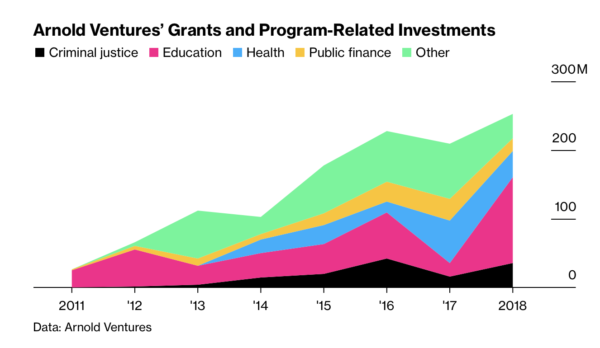…the majority of pledged money sits unspent, as U.S. tax rules make it easy to procrastinate… John and Laura Arnold want to change that…
Origen: Billionaires John and Laura Arnold’s Data-Driven Philanthropy – Bloomberg
Over the past few decades, the surging wealth of the top 0.1% has spurred many promises of lavish donations. But the majority of pledged money sits unspent, as U.S. tax rules make it easy to procrastinate. 2 Foundations need to pay out only 5% of their assets per year (less than typical market returns); money can sit indefinitely in a donor-advised fund, or DAF, which offers the same tax benefit as a foundation with far fewer rules. “People are getting a tax deduction today for giving that’s going to happen sometime—especially with DAFs—potentially much later in the future,” John says. “Is that really the spirit of the rules?”
DAFs are surging in popularity, with assets rising 20.1% in 2018 from the previous year, to $121.4 billion, according to the National Philanthropic Trust. Meanwhile, markets keep rising. 3 Even the most philanthropic billionaires—such as Bill Gates and Warren Buffett— are richer now than they’ve ever been.
“They have the intent to do good,” Laura says of her ultrawealthy peers. “But in practice it just isn’t happening.” Foundations and DAFs should spend at least 7%, John has proposed, which could end this “hoarding of resources” and get billions of dollars more to charities.
The idea behind running a philanthropy through an LLC rather than a foundation—most famously pioneered by Facebook’s Mark Zuckerberg and his wife, Priscilla Chan, in 2015— is that it gives everyone inside the organization much more flexibility and also makes their activities harder for outsiders to track. Tax rules require nonprofits to steer clear of political activity, but in an LLC, a health-care expert who once stuck only to research grants can now strategize with advocacy groups and even talk policy with lawmakers.
LLCs “can basically operate as naked political voices without any transparency,” Stanford professor Rob Reich says, though he adds that the Arnolds seem otherwise to be “appropriately inviting the scrutiny of journalists and the public.”
Update about philanthropist ways of doing, from: Macau Daily Times via @wealth-X
Giving in the 21st century is different to what it was last century – not just because of globalization, but because of technology and the digital age (the fourth industrial revolution).
Today, 4 billion people, that is 60% of the world’s population, have a cell phone. It just takes a click to donate.
Yes, the fourth industrial revolution has changed our way of living for ever but despite that phenomenal revolution, human beings are still (I would say astonishingly and admirably…) resilient. Culture and values still matter.
When an American gives online for the poor, or a Frenchman gives online for the Telethon, a Chinese person, despite living in one of the most digital societies, will still cherish the tradition of personally giving as they traditionally give a red envelope (laissi) to their loved ones during the Chinese New Year.
China has a long tradition of philanthropy and there is widespread consensus that it will grow and increase in impact over the next decades.
Charity is deeply embedded in the ethics of Confucianism and the rise of private wealth brought about by China’s development since the turn of the century will further boost the integration of China in modern philanthropy.
This is happening, but in a way not perceived or understood by the western world. One of the reasons that the level of philanthropy in China is not fully known may be that much giving is done informally or anonymously and therefore not captured in the existing data.
Another difference is that in China, the redistribution of wealth is more than a question of justice or social equality; it is a philosophical concept about what constitutes a harmonious society. Chinese philanthropists are very keen to learn about philanthropic practices elsewhere and particularly in the US, but there is also an affirmation that philanthropy, in China, must remain true to traditional Chinese values. As much as there is a “Socialism with Chinese Characteristics”, there is a “Philanthropy with Chinese Characteristics” that the West at large must understand.
This can only be done by profoundly mastering the complexities of different cultural values for the ultimate purpose of the common good.

